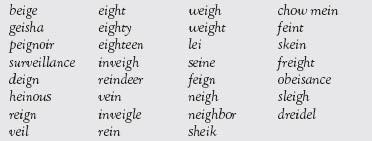The Complete Guide to English Spelling Rules (22 page)
Read The Complete Guide to English Spelling Rules Online
Authors: John J Fulford

And in North America,
cheque
is spelled
check
, despite the fact that the American Express Company sells traveler’s
cheques.
T
here is one spelling rule that everybody remembers—at least the first two lines. Some of us can even remember the next line. But what about the fourth line?

In the case of the word money, some dictionaries offer the choice of moneys or monies and moneyed or monied. Since the y is preceded by a vowel, there is no reason to change the y to i and thus no logical reason to break the rule.

I before e
except after c
or when sounding like ay in neighbor and weigh
or when sounding like eye in seismic and height
There are so many hundreds of words that contain
ie
or
ei
that we cannot be blamed if we sometimes doubt the validity of this rule, but the fact is that the rule is valid for an astonishingly high percentage of words. The true anomalies are very few.
The spelling rule governs only those words where the two letters form a diphthong. They must produce just one sound. Hundreds of words contain these two letters but do not fit the rule because the letters form separate syllables.
Science
is a two-syllable word.
Society
has four syllables.
Quiet, being,
and
deity
do not contain diphthongs.
In
hieroglyphics
, the letters
ie
form a diphthong, but in
hierarchy
they do not.
Spelling rule #1:
I
before
e
:

Note that there are hundreds of words in this group, but no commonly used English word starts with
ie.
Most of the words in this group will have the long
e
sound, but there are exceptions:

Spelling rule #2. … except after
c
:

A number of words seem to break this rule, but the vast majority of them are plurals like
vacancies
or comparatives like
juiciest
, where the
y
has been changed to an
i
. There are very few true anomalies.

Even these few anomalies are subject to argument as to whether or not the letters form a diphthong. This depends on how the word is pronounced.
Spelling rule #3. …or when sounding like
ay
. There are fewer than three dozen commonly used words that are spelled
ei
and sound like
ay
:

Some dictionaries offer an alternative pronunciation for three of these words.
geisha, obeisance
, and
sheik.
They are sometimes pronounced with the long
e
sound. but the long
a
sound follows the spelling rule and is therefore preferable.
Spelling rule #4. … or when sounding like
eye.
There are slightly more than two dozen words that are spelled
ei
and sound like
eye
. Many of them have been borrowed from the German.

Note that
either
and
neither
may be pronounced with the long
e
sound or the long
i
sound. Either pronunciation is
quite acceptable on either side of the Atlantic. However, the
eye
sound conforms to the spelling rule therefore it is preferable.
The following words stick to the main spelling rule despite the fact that they have the
eye
sound:

There is a very small group of words that have the short
i
sound. Centuries ago, the word
foreign
was spelled
forein
and the word
forfeit
was spelled
forfet.
Here are additional words with the short
i
sound:
